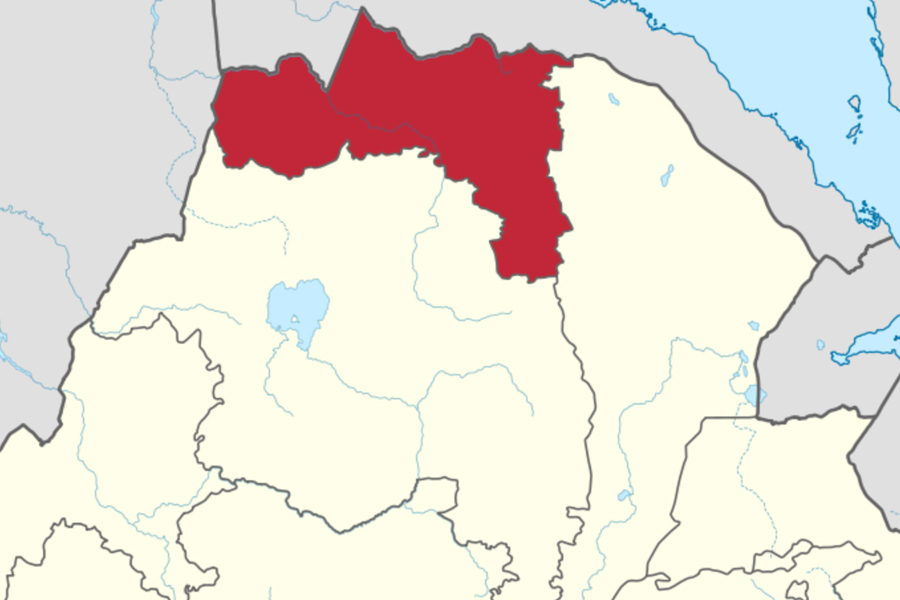
Fortune News | Sep 13,2025
Jan 27 , 2024.
Christopher Clapham, professor emeritus of Cambridge University and an expert on Ethiopia, describes the Horn of Africa region as "a perennially unstable region". It is often overshadowed by the dramatic geopolitics of the Middle East and historically great powers. Lately, though, a discreet yet significant diplomatic manoeuvre is unfolding after Ethiopia, a landlocked giant with a storied history and a population exceeding 105 million, has made a bold move through an accord with the self-declared Republic of Somaliland.
Seemingly peripheral in the grand schemes of wars and conflicts across the world, the accord could have profound implications for the region's balance of power.
A deal, inked between Prime Minister Abiy Ahmed (PhD) and Somaliland’s President Musa Bihi, remains shrouded in riddle, with both parties withholding the details. What seeps through, however, suggests an agreement involving a 50-year lease for Ethiopia to establish a naval base along a 20Km stretch of Somaliland’s coast. In exchange, Addis Abeba "might recognise" Somaliland's long-sought sovereign status.
Unsurprisingly, this quid pro quo has sparked a diplomatic furore, with Somalia, the parent state from which Somaliland unilaterally seceded in the early 1990s, vehemently opposing the arrangement. The Arab League, through Spokesperson Jamal Rushdi, has supported Somalia's position. So are several countries, from the United States to Turkey and from the European Union to the African Union (AU), compelled to issue a series of statements affirming Somalia's sovereignty and territorial integrity.
Ethiopia's quest for a maritime outlet is not novel. Historically landlocked, except for a brief period following the annexation of Eritrea, its leaders have long harboured ambitions of access to the sea. This aspiration reflects not just a quest for strategic depth but also a yearning to break free from the geographical constraints they feel have limited its economic potential.
Prime Minister Abiy’s Administration, under the banner of the Prosperity Party (PP), has been known for its ambitious rhetoric. The latest move can illustrate this tendency, suggesting a willingness to engage in high-stakes geopolitical bets on the world stage. The deal, if realised, could signal a major shift in Ethiopia’s strategic orientation, potentially providing it with a maritime presence that would have been unthinkable a few years ago. It could also signal a more assertive Ethiopian foreign policy, willing to make daring moves despite domestic challenges and the potential for regional backlash.
However, the timing and manner of the agreement should raise questions.
Still reeling from the repercussions of a brutal civil war, Ethiopia faces a cocktail of domestic crises, including macroeconomic instability, violent conflicts, and drought. Investing in overseas infrastructure might seem an ambitious move, but it could also be a risky diversion of resources needed at home. The country’s economy, though showing resilience, is hardly in a state to support ambitious external ventures.
The economic implications of such a venture are substantial. The costs of developing a commercial port, securing finance, and the time before seeing returns on investment are significant considerations. With its economic hurdles, Ethiopia must weigh these factors against the potential for lasting damage to its treasury and international standing.
The Ethiopian populace remains largely in the dark about the precise content of the deal, if not its implications. Expectedly, the absence of transparency from the government has fueled speculation and uncertainty. A state media documentary featuring Prime Minister Abiy discussing the geopolitical significance of maritime access a few months ago added to the air of mystery surrounding his administration’s intentions. The absence of a joint communique following the deal's signing is unusual, particularly for an agreement of such potential significance.
The opacity is not just a domestic issue for Ethiopia; it has regional implications, as neighbouring states and international actors seek to understand the motives and potential consequences of the diplomatic move. The international reaction has been swift and varied, for the Horn of Africa is a region where historical narratives, ethnic tensions, and strategic interests of global powers intersect.
The African Union (AU), with its headquarters nestled in Addis Abeba, serves as a crucial framework. Its Charter, a legatee to colonial legacies, mandates member states to respect territorial boundaries as demarcated during the colonial era. This principle underpinned Ethiopia's successful rebuttal of Somalia's territorial ambitions in the 1970s, grounded in the colonial-era demarcation agreed upon by Italy and Ethiopia. It was this same principle that the international court leaned on to adjudicate the border dispute between Ethiopia and Eritrea.
Yet, the case of Somaliland, a self-declared sovereign state, deviates from this norm.
With a fleeting taste of independence as a British protectorate before its unification with the south to form the Republic of Somalia, its quest for recognition taps into this uncommon historical vein. The early 1990s saw it reassert its independence, a move unheeded by Somalia's leadership and unrecognised internationally, despite Somalia's fragility under the duress of armed fundamentalist forces. An external peacekeeping force, spearheaded by the AU and supported by Ethiopian military deployment, remains indispensable in maintaining a semblance of stability, particularly in Mogadishu.
Ethiopia's boorish posturing in trading recognition for a naval base could be perceived as exploiting Somalia's vulnerabilities, igniting further tensions. The potential for Mogadishu to escalate diplomatic tensions into a full-blown legal challenge at an international court cannot be discounted. This would not bode well for Ethiopia, often regarded as a bastion of stability in a region marked by volatility, yet eyed warily by its smaller neighbours.
For Somaliland, the deal represents a high-stakes gamble in its quest for international recognition. Despite having a functional government and relatively stable governance compared to its neighbours, it remains unrecognised globally. Its leaders see this deal as a stepping stone towards achieving long-sought international legitimacy. However, this approach risks alienating Somalia and other regional actors, potentially complicating its path to recognition.
The quality of governance in Somaliland has shown signs of erosion under President Bihi, with his temptation to cling to power and the abrupt nature of the agreement he made with Ethiopia. It could undermine the legitimacy and democratic credentials that Somaliland has painstakingly built over the years. Its internal crises, particularly the conflict with the rebellious Las Anod region, add another layer of complexity.
While potentially offering maritime access, Ethiopia's alignment with Somaliland could embroil it in these internal conflicts, further straining its resources and diplomatic capital.
Somalia, which has long sought to bring Somaliland back into its fold, has rejected the agreement outright. It was a position echoed by the Arab League, affirming the regional implications of the deal. However, more worryingly for Ethiopia should be Egypt, its historical nemesis.
The reaction of Egypt, pronounced by its President, Abdel Fattah el-Sisi, is particularly notable. The longstanding GERD dispute has soured relations between Cairo and Addis Abeba, and Egypt’s support for Somalia could be seen as a strategic countermove. Ethiopia’s leaders must navigate these waters cautiously, as missteps could aggravate existing tensions and draw the country into more convoluted regional disputes.
Domestically, Ethiopia faces its own set of problems. Engaging in a potentially contentious maritime venture at this juncture could be seen as imprudent. While ambitious, its leaders' recent initiative to export wheat has proven to be a costly endeavour, unearthing the need for rigorous planning and economic pragmatism. Pursuing maritime access, a centuries-old aspiration for Ethiopian leaders, demands a careful balance between ambition and reality.
Ethiopia's leaders stand at a crossroads. The allure of maritime access and the economic opportunities it presents are undeniable. Nonetheless, the geopolitical and economic risks are formidable. The path forward requires a subtle approach, balancing the country's long-term interests with the realities of regional dynamics and its internal turmoil.
PUBLISHED ON
Jan 27,2024 [ VOL
24 , NO
1239]

Fortune News | Sep 13,2025

Fortune News | Mar 09,2024

Commentaries | Jul 17,2022

Fortune News | Nov 21,2020

Sunday with Eden | Oct 10,2020

Commentaries | Apr 26,2019

Radar | Feb 22,2020

Fortune News | Jul 29,2023

Viewpoints | Dec 05,2018

Commentaries | Apr 22,2022

Photo Gallery | 174581 Views | May 06,2019

Photo Gallery | 164809 Views | Apr 26,2019

Photo Gallery | 155002 Views | Oct 06,2021

My Opinion | 136695 Views | Aug 14,2021

Dec 22 , 2024 . By TIZITA SHEWAFERAW
Charged with transforming colossal state-owned enterprises into modern and competitiv...

Aug 18 , 2024 . By AKSAH ITALO
Although predictable Yonas Zerihun's job in the ride-hailing service is not immune to...

Jul 28 , 2024 . By TIZITA SHEWAFERAW
Unhabitual, perhaps too many, Samuel Gebreyohannes, 38, used to occasionally enjoy a couple of beers at breakfast. However, he recently swit...

Jul 13 , 2024 . By AKSAH ITALO
Investors who rely on tractors, trucks, and field vehicles for commuting, transporting commodities, and f...

Oct 12 , 2025
Tomato prices in Addis Abeba have surged to unprecedented levels, with retail stands charging between 85 Br and 140 Br a kilo, nearly triple...

Oct 12 , 2025 . By BEZAWIT HULUAGER
A sweeping change in the vehicle licensing system has tilted the scales in favour of electric vehicle (EV...

A simmering dispute between the legal profession and the federal government is nearing a breaking point,...

Oct 12 , 2025 . By NAHOM AYELE
A violent storm that ripped through the flower belt of Bishoftu (Debreziet), 45Km east of the capital, in...